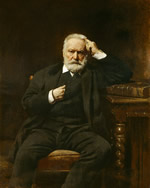Victor Hugo’s Exile

Victor Hugo is, without a doubt, the most famous figure ever to have lived in the Channel Islands.
He is famous worldwide as both a literary and political celebrity and he has succeeded in the difficult task of being both intellectually respectable and at the same time immensely popular, especially through two of his major works, ‘Notre Dame de Paris’ and ‘Les Misérables’, the latter of which was completed in Guernsey.
A Life of Literature & Politics
He was born in Besançon in 1802. He very soon realised that he had a literary calling, and by the age of 13 he’d won several awards, including two “mentions” from the Academie Francais.
1830 saw the publication of ‘Notre Dame de Paris’, with its evocation of life in the Middle Ages centred on the famous Paris cathedral. This novel has of course been on more than one occasion successfully adapted for the cinema, most recently as a Disney cartoon.

His time in Guernsey was to be his most prolific artisticly speaking. During this period he wrote, completed or published the majority of the works for which he is best known
In his earlier years Hugo had been a monarchist. Following the chaos of European wide political upheavals in 1848 Hugo was concerned that order should be maintained. To that end he welcomed and supported the candidature of Louis Bonaparte (Nephew of Napoleon Bonaparte).
However he soon realised that his moral and political ambitions were not shared by his political allies, and his relationship with them soon deteriorated to teh extent that by July 1851, his opposition to Louis Bonaparte had hardened to the point where he coined of the phrase “we have had Napoleon the Great, now we have to have Napoleon the Small”, and after the coup d’état of the 2nd December, which he tried in vain to oppose, he fled the country to avoid arrest, initially to Brussels.
However its close proximity to France meant that the Belgian Authorities were concerned about how his presence might strain relations between the two countries and in 1852 Hugo moved to Jersey where there were already a number of opponents to the new French regime.
In 1855, Queen Victoria’s visit to Paris caused a highly satirical article to be published by French exiles in a London newspaper, the contents of which were repeated by some of Hugo’s fellow exiles in the newspaper they had founded in Jersey. This led to three of them being expelled. Declaring his own solidarity with them led subsequently to the expulsion of Hugo himself. So he left Jersey for Guernsey in October 1855.
In 1856, he published ‘Les Contemplations’, a book of poetry which was an immediate success, and with the proceeds he bought 38 Hauteville in Guernsey.
His time in Guernsey was to be his most prolific artisticly speaking. During this period he wrote, completed or published the majority of the works for which he is best known, in particular :
- 1856 : ‘Les Contemplations’
- 1862 : ‘Les Misérables’
- 1877 : ‘La Legende des siecles’
- 1864 : ‘William Shakespeare’
- 1865 : ‘Les Chansons des rues et des bois’
- 1866 : ‘Les Travailleurs de la mer’
- 1869 : ‘L’Homme qui rit’
- 1874 : ‘Quatre-Vingt-Treize’
To varying degrees these works were substantial popular successes, particularly of course ‘Les Misérables’ which remains a popular literary work even today. It illustrates some of Hugo’s ideas on the social and moral issues of the time, which he felt to be important.
Although legally able to return to France in 1859, Hugo defiantly to remain resident in the Island until 1870, and he also in later years, notably for almost a year during 1872/1873.
However, of all his works, those which are of particular interest to Guernsey are ‘Les Travailleurs de la mer’ (Toilers of the Sea), the story of which takes place in Guernsey, and its preliminary book ‘L’Archipel de la Manche’, which constitutes even today an excellent guide to the Islands, and particularly Guernsey. Hugo intended it to be published as the first section of ‘Les Travailleurs de la mer’, but it was not published until many years later. In addition there are references to the Island in other works as well as in Hugo’s own notebooks and letters.
Return to France
Following the fall of Louis Bonaparte in 1870, Hugo returned to France as a hero and once more took an interest in political life during another period of upheaval further complicated by the Franco-Prussian war. He was elected to the National Assembly in 1871 and was by now a famous public and literary figure.
Hugo died in 1885, and was given a National Funeral. The coffin lay in state under the Arc de Triomphe and, on the 1st of June 1885, he was buried as a national hero in the Panthéon. It was estimated that at least two million people followed the funeral procession.
Hauteville house has been preserved exactly as he left it. Today it is owned by the city of Paris and is open to visitors.

Guernsey’s Official Victor Hugo website







You must be logged in to post a comment.